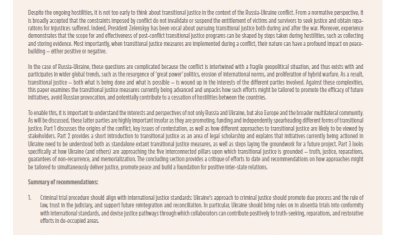Book Launch: Modes of Liability in International Criminal Law
Event


UN Photo
Modes of liability and criminal responsibility in general, have been vigorously debated in academia and by legal practitioners for decades.
Questions on criminal responsibility are pertinent:
- Is a business executive complicit for genocide when he traded chemicals with a regime suspected of using chemical weapons against civilians?
- Can a military commander be criminally liable when he or she did not commit crimes but failed to prevent them?
- To what extent are political leaders criminally liable for crimes committed by those in the lower echelons of government?
Customary international law has been resorted to as a source of law to plug gaps in the international legal framework. This has certainly worked for defining international crimes but what about criminal responsibility?
On the occasion of the launch of Modes of Liability in International Criminal Law, edited by Jérôme de Hemptinne, Robert Roth and Elies van Sliedregt and based on research undertaken at the Geneva Academy, panelists will discuss questions related to criminal responsibility for international crimes.
Introduction
- Robert Roth, former Director, Geneva Academy and Co-editor of the book
Panelists
- Paola Gaeta, Professor of international law, Graduate Institute
- Jérôme de Hemptinne, Researcher at the University of Geneva, Lecturer in Louvain, Paris and Lille and Co-editor of the book
- Elies van Sliedregt, Professor of International and Comparative Criminal Law, University of Leeds, Co-editor of the book









